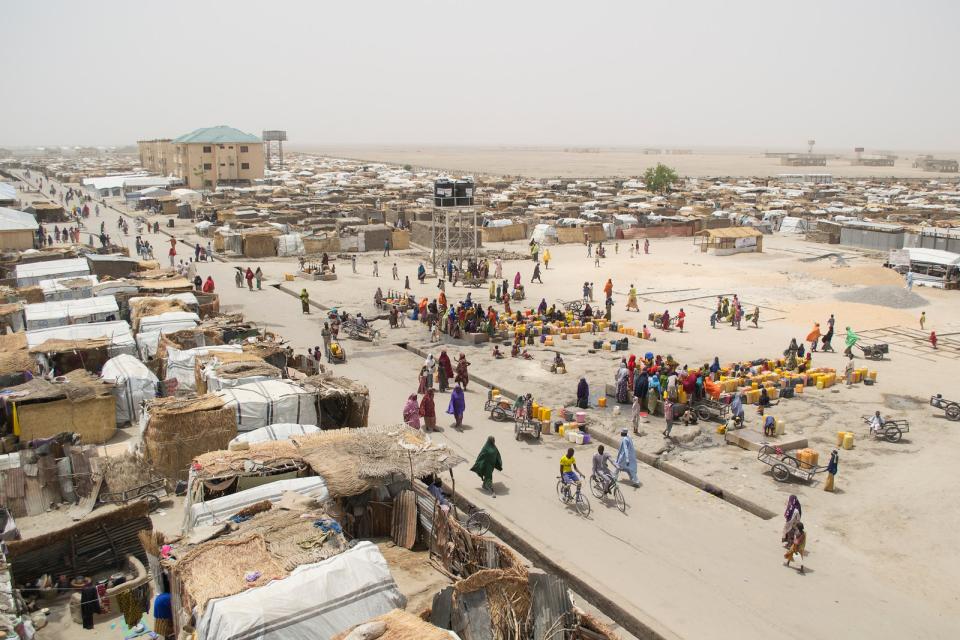Opinion: Enhancing the essential role of academia is a key recommendation from the High-Level Panel on Internal Displacement
30 December 2020
By Mark Yarnell, Research and Outcomes Officer, Secretariat of the UN Secretary-General’s High-Level Panel on Internal Displacement

International School IDP camp, Ngala, Borno, Nigeria. March 2018. Photo credit: OCHA / Yasmina Guerda
Geneva, 30 December 2021 - The report of the United Nations Secretary-General’s High-Level Panel on Internal Displacement, which it submitted to the Secretary-General in September 2021, puts forward dozens of recommendations to bring concrete improvements in prevention, response and solutions to internal displacement. This article focuses on the Panel’s recommendation to enhance the crucial, yet underutilized role of academia to inform the public about internal displacement while also providing guidance and expertise to policymakers and practitioners. The article describes first, how the Panel itself benefited from the inputs of academics and researchers; second, the specific recommendation on academia put forward by the Panel; and third, examples of how this recommendation is being implemented in practice.
To help frame key issues and to bring forward evidence and analysis for its consideration, the Panel benefited tremendously from the work of researchers and academics.
In particular, the Panel received targeted research papers on topics ranging from internal displacement as a development challenge to lessons learned from the experience of regional platforms in addressing internal displacement. Other topics included challenges and opportunities of improving prevention of displacement where disasters and conflict intersect and the role of IDP laws and policies in fostering responsibility and accountability of governments. Some of the papers were generated under a pro-bono partnership that the Panel’s Secretariat established with the University of London Refugee Law Initiative’s Internal Displacement Research Programme (IDRP) which facilitates regional networks of researchers in Africa, Latin America and the Middle East. Further, the Refugee Survey Quarterly made a specific call for papers to inform the work of the Panel and in December 2020 published a special issue titled “Improving Attention to Internal Displacement Globally.” Analysis was also provided by researchers from UN Habitat, the Joint IDP Profiling Service and the Institute for Environment and Development on the urban component of internal displacement, while others contributed essential research on the political economy of context-specific displacement crises. The Panel also benefited from original research by its Expert Advisory Group on a range of general and discrete questions, among inputs from other researchers and experts. The totality of this research, analysis and information played a crucial role in informing the Panel’s ultimate conclusions and recommendations.
While benefiting itself from academia, the Panel also recognized that engagement between policymakers and academia on internal displacement has been limited.
The Panel saw that this was due, in part, to both the lack of prioritization of this issue by academic institutions, as well as funding shortages for internal displacement-specific research. The Panel also concluded that Governments and international responders do not adequately consult researchers and experts that are currently carrying out research and analytical work on internal displacement, particularly those from displacement-affected countries and regions.
And there are already initiatives underway to bring this goal into reality. For instance, shortly after the launch of the report, a group of academics from around the world launched the web platform Researching Internal Displacement. It is a hub to connect academics, policy makers, practitioners, artists and people from displacement-affected communities with new research and analysis. It also offers a free online training course on internal displacement. The website is an open access platform that receives submissions in English, French, Spanish and Arabic, thereby reducing language barriers that can too often divide academics and policymakers. Importantly, a number of the articles published on the site are by researchers who are based in or from countries that are currently dealing with internal displacement. One example is the piece by Mhd Ekbal Anak, a PhD candidate in Damascus, about the need to promote better access to housing and property rights for Syrian women as an essential element to support solutions to internal displacement. In another piece, Francesca Randazzo Eisemann, a poet and professor from Honduras, uses poetic text to convey first-hand testimonials of those experiencing internal displacement, as well as local communities that are impacted by it. There is also a working paper on the challenges of local integration for IDPs in Cameroon by a lecturer at the Pan African Institute for Development—West Africa.
In another initiative, the newly established Climate Mobility Africa Research Network (CMARN) brings together both researchers and policy makers – from the continent and beyond – who are working on displacement and migration in the context of disasters and climate change in Africa, with the protection of the internally displaced as one of its areas of focus. The Network aims to promote policy-relevant research in Africa, including as recommended in the “Research Agenda for Advancing Law and Policy Responses to Displacement and Migration in the Context of Disasters and Climate Change in Africa,” launched in November 2021.
“Researching Internal Displacement” and CMARN are but two manifestations of the Panel’s recommendation on leveraging the academic world more effectively and connecting researchers and policy makers more consistently, in addition to supporting the ongoing work of existing research networks. These are all important starts which it is hoped will serve as examples and inspiration for others going forward.

